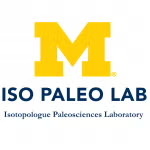Our research centers on understanding how terrestrial landscapes and organisms respond to past climate change.
We primarily use stable isotopic records to study interactions between mammals, vegetation, and climate in past ecosystems. Our work involves a combination of geologic fieldwork, isotopic lab work, and modern analog studies. Active projects include reconstructing Pliocene and Pleistocene environments from sedimentary and isotopic records preserved in the Afar region of Ethiopia, understanding hydrologic change during interglacials the upper Amazon Basin from lake and cave carbonate records in Peru, probing how soil carbonates formation in dryland regions of the US, understanding and communicating water balance in the Mono Basin, and building isotope records of Holocene lake level change in the Great Lakes region. Much of this work centers on leveraging the power of high precision Δ17O measurements from sedimentary archives and the hydrosphere, in modern and ancient systems.
Interested joining the group as an undergrad, grad student or postdoc? Click here for more information about the research happening in the lab. If you’re a prospective grad student, read this advice about the grad school application process and what to do as you start contacting potential faculty advisors.
We do our work as part of the UM IsoPaleoLab group – check out the IPL website, Instagram and Twitter feeds.
Here are some pictures of the latest action from our group via Instagram.


